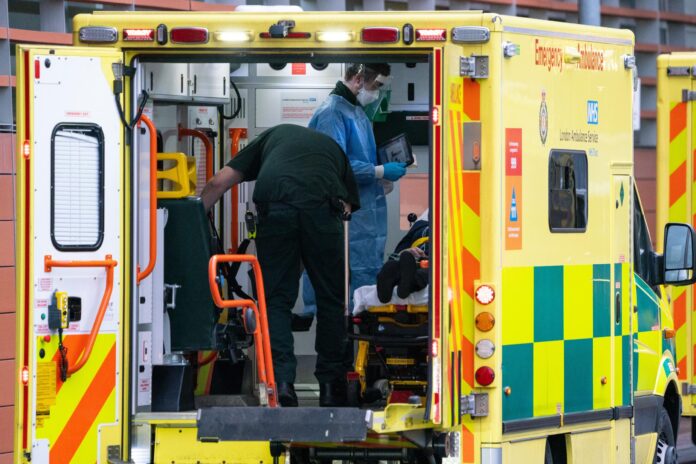Data from a survey of almost 4,000 staff and volunteers across police, fire and ambulance services in the UK* has laid bare the scale of poor mental health among emergency responders. The statistics come as Mind announces the relaunch of their Blue Light
Programme of wellbeing support for the emergency services, which has been funded by The Royal Foundation of The Duke and Duchess of Cambridge.
The online survey found that mental health has worsened across 999 services, but that ambulance staff were worst affected. Only one in four (26 per cent) ambulance staff reported their current mental health as very good or good compared to just over one in three police (35 per cent) and almost two in five (39 per cent) survey respondents working within the fire service.
Ambulance staff were the most likely (77 per cent) to say their mental health has worsened since the start of the coronavirus pandemic, compared to police (66 per cent) or fire (65 per cent). One in four (25 per cent) 999 staff and volunteers surveyed rated their current mental health as poor or very poor. The highest proportion of respondents saying they had poor mental health were within the ambulance service, at almost one in three (32 per cent). This compares to just under one in four (23 per cent) respondents from the police service and one in five (20 per cent) within the fire service who rated their mental health as poor currently.
Responding to these survey findings, Emma Mamo, Head of Workplace Wellbeing at Mind, said:
“We know that even before the coronavirus outbreak, there were high rates of poor mental health across the emergency services. It’s clear from this latest survey data that the mental health of our emergency responder community has got even worse, with ambulance staff and volunteers hardest hit. Blue light staff have told us that working within the emergency services – especially the ambulance service – is a hugely rewarding but challenging job. Our survey data and interviews with 999 staff and volunteers indicate that coronavirus has made these roles even more demanding, as staff are faced with making more difficult and potentially life-and-death decisions on a daily basis, as well as dealing with death and bereavement, in addition to concerns for their own health and wellbeing and that of their loved ones.
“It’s really important that our hardworking emergency responders are able to access support for their wellbeing if and when they need it. Thanks to funding from The Royal Foundation of The Duke and Duchess of Cambridge’s COVID-19 Response Fund, Mind is delighted to once again be providing wellbeing support, training and resources to all 999 staff and volunteers via our Blue Light Programme. Over the next year, we hope to be able to reach as many people as possible who need our support. We also hope to help employers embed best practice so that staff and volunteers can continue to access the right support for them in the short and longer-term, as we begin to come to terms with the true mental health impact of the pandemic.”
Carl Petch is 38 and works for Greater Manchester Fire Service (GMFRS) as a Fire Safety Officer. He said:
“I’m very fortunate that I have never experienced mental health problems – I am generally a resilient and positive person. But I am aware of a number of colleagues who have struggled, particularly over the past year. There is still a problem around staff not feeling able to open up about their mental health to managers and colleagues, but things are getting better and the organisation has lots of health and wellbeing support in place. I know how tough the pandemic has been on other emergency services as well,
particularly ambulance and fire and rescue services.
“Previously when I’ve had difficult challenges in my life – for example when I became a single Dad in 2017 – GMFRS was really supportive and I could access support through Mind’s Blue Light Programme. I was also able to access counselling in the past which I found useful – it provided me with some more ‘tools’ I can use in building the resilience you need to be able to work in the fire and rescue service.”
Responding to Mind’s survey data, Anna Parry, Deputy Managing Director at the Association of Ambulance Chief Executives (AACE) said:
“Healthy ambulance staff are integral to the services we provide to patients which is why the data emanating from the Mind survey is particularly worrying. However, with demand for ambulance services at its highest ever level, alongside the additional unique demands of the COVID-19 pandemic, it is perhaps unsurprising that our front-line staff are experiencing pressures that are impacting upon their mental health and this is something the sector is working hard to mitigate.
“Promoting safe and healthy working environments for all ambulance staff, as well as volunteers, is a key national strategic aim for AACE and we are working with our members to ensure that progressive employment policies are in place that are designed to assist the creation of a good work-life balance and, in turn, help support staff who suffer from stress related illness – be it work or non-work related.
“Wellbeing support is offered to all ambulance service staff and volunteers at both local and national levels. A primary focus for us is working with Mind and other partners to ensure the suitability and effectiveness of existing support whilst enhancing understanding and awareness of employee mental health and wellbeing and the range of supports available. We very much welcome the opportunity to continue this work with Mind as part of their Blue Light Programme.”







